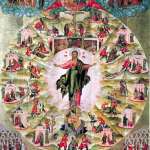There’s a big green book that’s the size of a dictionary that I’ve been reading this year. It’s the Catechism of the Catholic Church, and if it weren’t for Matthew Warner and his Read the Catechism in a Year program, I’d be a lot more ignorant about things that are happening in the news that relate to my faith.
 Thankfully, Matt’s little internet gnomes shoot me bite-sized pieces of the CCC everyday. Having started this task back on October 10 of last year, I keep waiting to be hit with the e-mailed section that is the size of the iceberg that sinks the Titanic. But so far, that has yet to come to pass.
Thankfully, Matt’s little internet gnomes shoot me bite-sized pieces of the CCC everyday. Having started this task back on October 10 of last year, I keep waiting to be hit with the e-mailed section that is the size of the iceberg that sinks the Titanic. But so far, that has yet to come to pass.
The uncanny thing, or so it seems to me, is the news related timeliness that some of the passages arriving in my e-mail box correspond with. Just yesterday (Day 130), for example, we finished the short section where the Hierarchy of the Church, you know, the Pope, and the College of Cardinals, and the Bishops was discussed. Smack dab in the middle of the biggest Papal news in six centuries. How’s that for timing?
Today we move on to the role of the laity, which corresponds to what the military minded recognize as the bulk of the forces of the faithful. Here is where the idea for the title of this post came from. You know that whole modern idea where you must hide your faith light under a bushel, and never let it shine accept when you are in Church worshipping, or something? Right. Any religious person from any faith tradition knows that this is complete bunk.
So it should not shock you that the Catholic Church says,
II. THE LAY FAITHFUL
897 “The term ‘laity’ is here understood to mean all the faithful except those in Holy Orders and those who belong to a religious state approved by the Church. That is, the faithful, who by Baptism are incorporated into Christ and integrated into the People of God, are made sharers in their particular way in the priestly, prophetic, and kingly office of Christ, and have their own part to play in the mission of the whole Christian people in the Church and in the World.”
Did you get that? Priests, prophets, and ambassadors of the King, coming direct to you. It’s what we do, and it is a 24 hour/7 day a week mission. More on that below.
The vocation of lay people
898 “By reason of their special vocation it belongs to the laity to seek the kingdom of God by engaging in temporal affairs and directing them according to God’s will. … It pertains to them in a special way so to illuminate and order all temporal things with which they are closely associated that these may always be effected and grow according to Christ and maybe to the glory of the Creator and Redeemer.”
899 The initiative of lay Christians is necessary especially when the matter involves discovering or inventing the means for permeating social, political, and economic realities with the demands of Christian doctrine and life. This initiative is a normal element of the life of the Church:
Dictionary break for anyone not sure what the word permeate means. How about these handy synonyms, eh? interpenetrate, percolate (into), pervade, riddle, suffuse, transfuse. Back to the mission (bold highlights are mine),
Lay believers are in the front line of Church life; for them the Church is the animating principle of human society. Therefore, they in particular ought to have an ever-clearer consciousness not only of belonging to the Church, but of being the Church, that is to say, the community of the faithful on earth under the leadership of the Pope, the common Head, and of the bishops in communion with him. They are the Church.
The above is a quote by Pope Pius XII. The handy Catholic Cross Reference feature Matt included with these e-mailed sections is awesome.
900 Since, like all the faithful, lay Christians are entrusted by God with the apostolate by virtue of their Baptism and Confirmation, they have the right and duty, individually or grouped in associations, to work so that the divine message of salvation may be known and accepted by all men throughout the earth. This duty is the more pressing when it is only through them that men can hear the Gospel and know Christ. Their activity in ecclesial communities is so necessary that, for the most part, the apostolate of the pastors cannot be fully effective without it.
So the idea that Catholic Christians can’t engage in the public square, have to keep their faith out of their daily lives (except on Sunday), and can’t let their faith mold their consciences, etc. is a nonstarter. Political elites, media elites, and anyone who considers themselves knowledgeable, or well informed, should not be shocked when us lilliputs push back on the HHS Mandate, or anything else that limits our religious liberty.
See, it’s like telling priests to keep their faith under wraps. Not.Gonna. Happen. We little lay people are the royal priesthood with the same mandate to the priestly, prophetic, and kingly office of our Lord and Savior. Your memo continues,
The participation of lay people in Christ’s priestly office
901 “Hence the laity, dedicated as they are to Christ and anointed by the Holy Spirit, are marvelously called and prepared so that even richer fruits of the Spirit may be produced in them. For all their works, prayers, and apostolic undertakings, family and married life, daily work, relaxation of mind and body, if they are accomplished in the Spirit — indeed even the hardships of life if patiently born — all these become spiritual sacrifices acceptable to God through Jesus Christ. In the celebration of the Eucharist these may most fittingly be offered to the Father along with the body of the Lord. And so, worshipping everywhere by their holy actions, the laity consecrate the world itself to God, everywhere offering worship by the holiness of their lives.”
Did you see what I did there? Everywhere…even if we make a hash out of it. Like in our families.
902 In a very special way, parents share in the office of sanctifying “by leading a conjugal life in the Christian spirit and by seeing to the Christian education of their children.”
Like in our parishes.
903 Lay people who possess the required qualities can be admitted permanently to the ministries of lector and acolyte. When the necessity of the Church warrants it and when ministers are lacking, lay persons, even if they are not lectors or acolytes, can also supply for certain of their offices, namely, to exercise the ministry of the word, to preside over liturgical prayers, to confer Baptism, and to distribute Holy Communion in accord with the prescriptions of law.”
And you’ll especially enjoy this next section. It’s where we hold you accountable when you go off the rails, overreach your authority, and basically make a mockery out of the true, the good, and the beautiful.
Participation in Christ’s prophetic office
904 “Christ … fulfills this prophetic office, not only by the hierarchy … but also by the laity. He accordingly both establishes them as witnesses and provides them with the sense of the faith [sensus fidei] and the grace of the word”
To teach in order to lead others to faith is the task of every preacher and of each believer.
905 Lay people also fulfill their prophetic mission by evangelization, “that is, the proclamation of Christ by word and the testimony of life.” For lay people, “this evangelization … acquires a specific property and peculiar efficacy because it is accomplished in the ordinary circumstances of the world.”
Remember the meaning of permeate? You can’t dam us up and keep us behind getto walls. If you did, see, we couldn’t do the other thing we’re called to do.
This witness of life, however, is not the sole element in the apostolate; the true apostle is on the lookout for occasions of announcing Christ by word, either to unbelievers … or to the faithful.
906 Lay people who are capable and trained may also collaborate in catechetical formation, in teaching the sacred sciences, and in use of the communications media.
907 “In accord with the knowledge, competence, and preeminence which they possess, [lay people] have the right and even at times a duty to manifest to the sacred pastors their opinion on matters which pertain to the good of the Church, and they have a right to make their opinion known to the other Christian faithful, with due regard to the integrity of faith and morals and reverence toward their pastors, and with consideration for the common good and the dignity of persons.“
So there you have it in a nutshell. We are the laity. Containment is futile. Odetta knows (and now so do you).
















